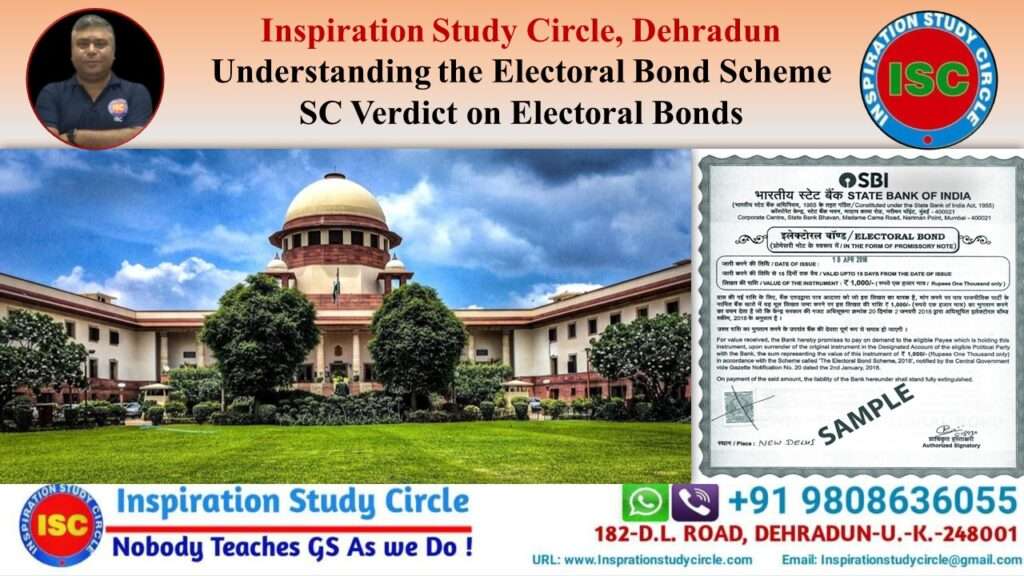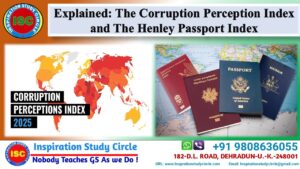
UKPSC- PCS 2026 Prelims Test Series
UKPSC- PCS 2026 Prelims Test Series Table of Contents UKPSC- PCS 2026 Prelims Test Series The Uttar Pradesh Provincial Civil
Electoral bonds were a way of financing political parties in India. The Anonymous Electoral Organization Scheme was introduced in the Finance Bill, 2017 during the Union Budget 2017-18. These Electoral Bonds were declared unconstitutional by the Supreme Court on February 15, 2024. The election funding system, which was in place for seven years, was stopped with immediate effect by a five-judge bench headed by the Chief Justice who directed the State Bank of India to stop issuing these bonds and called the scheme “violative of RTI (Right to Information)“.

In a landmark decision, the Supreme Court of India has struck down the electoral bond scheme, ushering in a new era of transparency in the country’s political landscape. The ruling, which also invalidated the amendment allowing unlimited political donations, is an important milestone in the ongoing fight against corruption and undue influence in electoral processes.
An electoral bond is a financial instrument that functions like a promissory note and an interest-free banking instrument. Any Indian citizen or organization registered in India can purchase these bonds after meeting the KYC norms prescribed by the RBI. It can be received by a donor through check or digital payment in various denominations such as one thousand, ten thousand, one lakh, ten lakh, and one crore from certain branches of the State Bank of India (SBI). Within 15 days of issuance, these electoral bonds can be redeemed in the designated account of a political party duly registered under the Representation of the People Act, 1951.
Electoral bonds have the feature of anonymity as there is no identity of the donor and the political party to which it is issued. In case the 15-day deadline is not met, neither the donor nor the recipient political party gets a refund for the electoral bonds issued. Instead, the fund value of electoral bonds is remitted to the Prime Minister’s Relief Fund.
Implementation of donation amounts above ₹2,000 through the banking system would also enable the declaration of assets by political parties and their traceability. It was argued by the government that this reform of electoral bonds is expected to increase transparency and accountability in the field of political funding, while also preventing the creation of illegal funds for future generations.
The electoral bonds scheme has been subjected to legal challenge through a Public Interest Litigation (PIL) in the Supreme Court of India on two grounds.
The PIL was initiated in October 2017, with the Ministry of Finance submitting its response in January 2018 and the Law Ministry responding in March 2018.
Features of electoral bonds and the process involved are:
Introduced by the Center in 2018, the Election Bond Scheme allowed individuals and corporations to anonymously fund political parties by purchasing election bonds from the SBI.
The central idea behind the Electoral Bond Scheme was to bring transparency in election funding in India. The government described the plan as an “electoral reform” in a country moving towards a “cashless-digital economy”.
However, Critics of the scheme have argued that electoral bonds allow donors and political parties to hide their affiliations from the public while the SBI and, by extension, the government can track donations.
The electoral bonds scheme was introduced in the Finance Bill.
The NGO ‘Association for Democratic Reforms’ filed a petition challenging the scheme in the Supreme Court.
The Central Government officially notified the Electoral Bond Scheme.
The scheme was amended to extend the sale days from 70 to 85 in a year where any assembly election may be scheduled.
A Supreme Court bench, led by CJI DY Chandrachud, referred pleas against the scheme to a five-judge Constitution bench.
The five-judge Constitution bench, headed by CJI D Y Chandrachud, began hearing pleas against the electoral bonds scheme.
The Supreme Court reserved its verdict on the matter.
The Supreme Court delivered a unanimous judgment annulling the electoral bonds scheme, directing the State Bank of India to disclose details of contributors to the scheme to the Election Commission by March 6. The Election Commission is instructed to publish this information on its official website by March 13.
The Supreme Court of India directed the SBI to immediately stop issuing further electoral bonds and submit details of such bonds purchased by political parties since April 12, 2019, to the ECI by March 6, 2024.
Such details shall include the date each bond was purchased, the name of the bond purchaser, and the name of the bond purchased. ECI will then publish all the information shared by SBI on its official website by March 13, 2024.
Electoral bonds, that have not been issued by political parties, must be returned within fifteen days, after which the issuing bank will refund the amount to the recipient’s account.
Disclaimer: the information for the above article is taken from: Indian Express, India TV e-news platform, and Wikipedia.

UKPSC- PCS 2026 Prelims Test Series Table of Contents UKPSC- PCS 2026 Prelims Test Series The Uttar Pradesh Provincial Civil

Explained: India AI Impact Summit 2026 Table of Contents India AI Impact Summit 2026 India AI Impact Summit 2026 The India

The Corruption Perceptions Index, and The Henley Passport Index Table of Contents The Corruption Perceptions Index, and The Henley Passport

India- USA Interim Trade Agreement (2026) Table of Contents India- USA Interim Trade Agreement (2026) In early February 2026, India and

Explained: India- EU FTA “The Mother of All Deals” Table of Contents India- EU FTA “The Mother of All Deals

UPPSC- 2026 Calendar Released Table of Contents UPPSC- 2026 Calendar Released Brought to you by Inspiration Study Circle UPPSC- 2026